READER COMMENTS ON
"BREAKING FL-13: NEW UNDISCLOSED LETTER OF AGREEMENT FROM ES&S TO STATE UNEARTHED!"
(29 Responses so far...)
COMMENT #1 [Permalink]
...
neildeal
said on 3/24/2007 @ 7:11 pm PT...
Dirty bastards.
And the mixture of business and government is called what again??
COMMENT #2 [Permalink]
...
joe
said on 3/24/2007 @ 7:16 pm PT...
This is fascinating. For one, they say,
"No statements discussing the use or manner in which system passwords are used, constructed or stored."
Then, if you look at the last page of the SAIT report, it says,
"Each of the other passwords mentioned above is fixed and hard-coded into the source code. They are the same for all iVotronic machines in the country, and likely to be known to every election official who manages elections on an iVotronic machine. They can never be changed, without changing the firmware on the iVotronic machine. This represents poor practice."
I'll have a post in an hour or so on my blog about the extent to which the report actually "obeys" any of this.
COMMENT #3 [Permalink]
...
DES
said on 3/24/2007 @ 8:24 pm PT...
"testing is to focus solely on whether or not 'code or logic exists in the software that would have directly and conclusively caused voter selections to not have been captured or to have been omitted'"
...i'm no computer expert, but is it possible for the anomalous undervote rate to have been caused indirectly, through other code that was excluded from testing within the narrow dictates of the letter?
because he clearly states that "Review of source code that is not involved in these functions is outside the bounds of this source code review." So that means there is additional source code, and would logically lead to questions about just what is contained in that OTHER source code, eh?
And no one representing the state (or writing the reports, or doing anything that has anything to do with ES&S) is allowed to say or even infer that perhaps there might have been better ways to construct the code, or better security methods, or anything.
and he stipulates that there will be no questions about the physical security of the machines, or the conduct of the election procedures. hmmm.... guess he heard about those "sleepovers" from the stories on Brad Blog.
gee --- reading this letter, one might think the ES&S vice president didn't have much faith in his product.
COMMENT #4 [Permalink]
...
Brad Friedman
said on 3/24/2007 @ 9:01 pm PT...
DES (#3) wondered:
i'm no computer expert, but is it possible for the anomalous undervote rate to have been caused indirectly, through other code that was excluded from testing within the narrow dictates of the letter?
I do not consider myself a computer expert either. But I did spend about ten years of my life as a software programmer.
Based on that experience and credentials, then, I'd answer the question with a "yes, absolutely, beyond a shadow of a doubt".
Many is the time that a problem I'd created elsewhere in some unrelated routine in a program would cause an indirect, seemingly unrelated problem elsewhere.
That kind of bug is often the most difficult to troubleshoot. The problem is then compounded when you're dealing with the technical limitations, requirements and quirkiness of touch-screen hardware and the needs of its interface on top of the underlying main routines of the voting software routines themself.
COMMENT #5 [Permalink]
...
KestrelBrighteyes
said on 3/24/2007 @ 9:26 pm PT...
Okay, so what's next on the legal front?
And WHEN can Christine Jennings take her rightful seat in Congress?
COMMENT #6 [Permalink]
...
Mark S
said on 3/24/2007 @ 9:28 pm PT...
Don't you just love independent audits?
All you need is to have paper ballots so that you can audit the machine count and everything will be fine, right? Remember, Democratic Pelosi swore in the Republican in the Sarasota case, and by the time it is investigated and litigated, his term will be over and he will have voted to send your kids off to commit war crimes, to tax you to enrich Halliburton, and against impeachment.
As Paul Lehto has stated repeatedly, you have to get it right the first time. There is no possible redo of an election based on an audit. The CA50 case involved op-scans which had paper ballots. The result was exactly the same as in Sarasota where there was no paper ballot. The Republican was sworn in and if anyone is ever able to prove that he wasn't elected, he'll be drawing a Congressional pension and won't give a hoot.
Hand-counted paper ballots at the precincts with full citizen oversight aren't perfect. They can have up to a full 1% error rate. Other systems, including mechanical lever machines, DREs, punch cards, and optical-scans, have more than a 5% error rate and sometimes as high as a 4,000% error rate. Since elections are often decided by less than 5% of the total votes, do we really want to entrust them to systems that have a greater than 5% error rate?
I was told that Richard Stallman, the founder of the Free Software movement and a man whose knowledge of computers is greatly respected, was asked after a talk the other day about open source code in voting machines and he gave many examples of how it could be used to rig elections and concluded that computers have no place in elections. If Stallman says that votes should be on paper, I doubt if there is anyone in the computing world with the authority to refute him and I can't think of anyone who commands more respect.
There is no such thing as an independent audit, and even if there were, it could never change the result of an election. The election is over when the Secretary of State transmits the partial machine count to Congress, who can then swear in the "winner," but an audit cannot even begin until all the votes have been counted. What good is an audit of half an election? And nobody can request a recount until the election is certified, by which time the "winner" has redecorated their new office, hired their new staff, and voted for any bill that would continue to allow elections to be rigged.
COMMENT #7 [Permalink]
...
robin gibson
said on 3/24/2007 @ 10:24 pm PT...
I'm speechless. and that is a rarity.
COMMENT #8 [Permalink]
...
Jeannie Dean from District 13
said on 3/24/2007 @ 10:49 pm PT...
Wow, Brad!~
Now it all makes perfect sense. From the very beginning of this Freaky FRAUDIT, Kathy Dent, David Drury and other Officials have almost gleefully displayed their unsettling, one-sided love affair with ES&S. In fact, during the Sarasota Recount in November, S.O.E. Kathy Dent presented her fellow Canvassing Board Members with a CONTRACT from ES&S granting the e-voting software giant the role of "consultant" during the proceedings. (Neither Board Member approved the contract, or signed it at that time.)
No wonder Dent and Drury are so torked! They have to remember what NOT to say at ALL TIMES--like localized, mini-Tony-Snows! (Some Loyal Lickers they get, huh? Jeez, I hope they get big bucks for peddling that kind of soul-ripping stretch.) All those creepy bullet points tell me WHY they side-stepped every question, sweating and swallowing and stuttering through every press conference; why they denied emphatically it could ever be the machines despite so much evidence to the contrary; why they consistantly met the voter's legitimate concerns with hostile aggression/ condescension. They even stooped so low as to blame them by invoking their old and tired "voter confusion" mantra, parroted over and over again by their henchmen as the official cause for a massive undervote that altered the outcome of a national election and that, we now know, THEY CAUSED. Shame. Grotesque, debilitating shame on Florida. Again. (It's a three-peat!)
Another fun fact for your consideration: A National USA TODAY Poll taken 2 weeks prior to the 2006 Elections put Congressional Democratic Candidates in 50-50 districts ahead by 13%. Sarasota is a 50-50 district. The undervote rate came it at 14.9%. In the ONE county Jennings would have won, as experts from both sides have testified under oath.
I was wondering: couldn't they have micro-targeted Sarsota and determined with some precision exactly how many undervotes it would take to swing the election? And as Election Defense Alliance Co-Founder Jonathan Simon has astutely pointed out, the Republicans didn't have time to adjust the PBE's for so many late October surprises that worked against them for once, (i.e. Foley and Haggert)...?
Anyone?...What woud you all suggest we do to get rid of Dent? Her resignation is long overdue!
Thank you, Brad, for keeping me abreast of my little County's corruption from clear across the country. Very nice of you!
Sincerely,
Jeannie Dean
VIDEO THE VOTE
Sarasota, FL.
COMMENT #9 [Permalink]
...
Jeannie Dean from District 13
said on 3/24/2007 @ 11:35 pm PT...
Our original footage from the Sarasota RECOUNT 2006: brief overview of Kathy Dent's bizzare mistakes and managment style; includes mysterious absentee ballot net change of one additional vote from original election night results/ Dent announcing results to press, offers no explanation for undervote/ Buchanan's lawyer calls for Jennings to step down/ Canvassing board tallies up precinct totals on a calculator...
http://www.youtube.com/watch?v=vM-u7uipdrk
COMMENT #10 [Permalink]
...
alans
said on 3/24/2007 @ 11:39 pm PT...
You people are one of two things kool-aid drinking liberals or love to spread assine conspiracy theories. These machines only accounted for 20% of all the votes cast in Florida. Stop dreaming and whining Christine Jennings and Vern ran horrible nasty campaigns and people rejected both of them. The undervotes only happened in that race because people didn't feel either candidate was worthy of their vote in a mostly republican district.
COMMENT #11 [Permalink]
...
Brad Friedman
said on 3/25/2007 @ 12:37 am PT...
AlanS -
I've warned you before and I'm doing it now again. For the last time. 1) Do NOT personally attack other commenters. 2) Do not post knowing disinformation.
You are walking the line on both counts above. And in case #2 wasn't "knowing" for you, I'll say it again for you: The 15% undervote rate was on Sarasota's touch-screen DRE systems only. The undervote rate for the same race in the same county on paper absentee ballots was a normal 2.5%. Similarly, the undervote rate was the same normal rate in other counties in the FL-13 race. All of which blows your kool-aid drinking kook theory that 15% of the voters only in Sarasota and only when voting at the polls, didn't like that "horrible nasty campaign".
Now you know (as if you didn't before). Do it again and you are gone for good. Got it? Swell.
COMMENT #12 [Permalink]
...
darker
said on 3/25/2007 @ 1:07 am PT...
Computer/electronic voting is MADE TO ORDER FOR FRAUD by anyone wishing to manipulate it. It is the vulnerable nature of that technology which makes it so.
Today's technology for Computer/electronic voting should NOT be used.
It is far better to use simple paper balloting than fall prey to the FRAUD-PRONE digital systems offered by companies making a killing on tax-payer monies, in addition to killing off confidence in the U.S. voting process.
COMMENT #13 [Permalink]
...
Dredd
said on 3/25/2007 @ 5:28 am PT...
This letter is of the type written by those at the top of the growing conspiracy to corrupt the '08 election. The uppresidented plan is being managed by Rove in and at the White House.
It includes Attorneygate as a means of placing operatives in key states to corrupt the election by thwarting democratic activity and voting thru bad prosecutions of democratic voters and candidates.
The person who actually hired the current White House Counsel does not like what he sees:
One further disclosure: I have never been an advocate of executive privilege, except as it might relate to the most sensitive national security information. To the contrary, you show me a White House aide who does not want his conversations and advice to the president revealed, and I will show you someone who should not be talking with or advising a president.
(John Dean Article).
Attorneygate investigations could ruin the plan to corrupt the '08 election ... if congress can "be all it can be".
COMMENT #14 [Permalink]
...
PrissyPatriot
said on 3/25/2007 @ 8:01 am PT...
In a local race I investigated the undervote was 119,000- total votes about 270,000. BOE cannot explain this-can anyone on this blog take a swing? Thanks
COMMENT #15 [Permalink]
...
CharlieL
said on 3/25/2007 @ 12:30 pm PT...
Brad (in re #11):
I want to commend you for your handling of this situation. I have long believed that those who manage and control liberal blogs must be as "strict" as those who control the right-wing nutjob blogs where anybody who questions the dominant paridigm (even with facts and solid links) is immediately banned.
Wing-nuts have the whole mainstream media to carry their water --- we must protect our discussion from those who would subvert them with mis-direction and diffusion. Honest discussion is one thing (such as, should this criminal cabal in the White House be shot for treason or just jailed for life) but trolling and/or trying to plant false memes is not acceptible and should not be allowed in the name of any false concept of "free speech" that they won't give us.
Thanks again for holding a tough line against the lying scum when they appear and making BradBlog.com "The premier blog for election reform information."
CharlieL
Portland, OR
COMMENT #16 [Permalink]
...
joe
said on 3/25/2007 @ 12:36 pm PT...
I attempted to re-read the SAIT report and compare the list of limitations to the report text (see this post). Short version: it doesn't seem like the report authors thought much of this list of limitations in the writing of their report. I'd be surprised if this letter was the last one that was exchanged between ES&S and Drury; that is, I bet this list was unacceptable or non-binding or something (or ES&S felt that fighting the final report would have weakened their position).
COMMENT #17 [Permalink]
...
JUDGE OF JUDGES
said on 3/25/2007 @ 2:16 pm PT...
"Ya can't tell the difference between an attaché case and a machine gun anymore!"
COMMENT #18 [Permalink]
...
fran
said on 3/25/2007 @ 2:31 pm PT...
I don't subscribe, usually, to conspiracy theories.
But my-oh-my. Could it be?
However, collusion fits just fine. And in this case
the collusion is between the government of the people,
and corporate interests. I don't want to cast
the first stone, but one wonders --- can these civil
servants be such good soldiers of corporations --
or is there financial remuneration. Or has the corporate mentality exemplified by Bushco taken over
Floridian psyches.
COMMENT #19 [Permalink]
...
neildeal
said on 3/25/2007 @ 4:10 pm PT...
Fran
I hear ya. I wonder how these people can commit such atrocious acts and not think anything is wrong with it.
Is it corruption? We've all seen good examples of that in Florida. It seems to make for a perfect relationship between business and government. When government gets corrupted and no longer performs oversight on the private sector, the private sector then gets to run wild, and the two become fast friends. There is no gatekeeper between the two. Very bad! This seems to be the perfect example of why business oversight is needed.
Then you add in the whole authoritarian ideology thing and it gets even more confusing. I think that this part of the equation is what really makes these people so amazingly blind to the rule of law. They think that they are doing the right thing so why should those pesky laws matter?
COMMENT #20 [Permalink]
...
big dan
said on 3/25/2007 @ 6:49 pm PT...
This was in my local paper:
WILKES-BARRE — An official with Election Systems & Software inspected 31 Luzerne County voting machines Tuesday and concluded they were programmed and calibrated properly.
Advertisement
The touch-screen machines were set aside after the Nov. 7 election in response to complaints that a voter choices were flipped to unintended candidates on the screen.
“Vote flipping — there is no such thing as that,” said Willie “Wes” Wesley Jr., a regional accounts manager with Nebraska-based ES&S. “It’s really a calibration issue.”
http://www.citizensvoice...dept_id=455154&rfi=8
When I forwarded Brad's ES&S articles, including this one, to the head of our county elections bureau, stating that of course an ES&S rep would say this, I got a reply back from our elections bureau chief, "What do you know Daniel…are you a PHD in computer technology. Do you work with and educational outlet that studies this matter?
I don’t recall seeing you at the test.
The test was conducted in full view of the press and public in a sterile environment to simply check calibration.
Please share the know you have about the security you possess.
As far a blogs, I don’t particularly have an interest and base my security procedures on those analyzed by the Brennan Center at the NYU School of Law".
COMMENT #21 [Permalink]
...
GWN
said on 3/25/2007 @ 7:29 pm PT...
COMMENT #22 [Permalink]
...
the_zapkitty
said on 3/25/2007 @ 8:00 pm PT...
Hmmm... according to the article Diebold is saying that the state and the disabled are incompetent to decide which of the available machines best meets their needs.
Diebold: "The Decider" For The Disabled.
COMMENT #23 [Permalink]
...
Brant Lamb
said on 3/26/2007 @ 5:58 am PT...
Here is the problem with receiptless, untraceable voting. Whatever laws you pass to protect receiptless, untraceable, anonymous voting, if it is subverted or defied at single or mulitple places, the 'honey pot' of anonymous ballots can be partially altered, consumed, replaced or deleted, and then it is an accomplished fact, there's nothing you can do about it.
COMMENT #24 [Permalink]
...
the_zapkitty
said on 3/26/2007 @ 7:18 am PT...
This mindless persistence in ignoring the reason for the secret ballot is way past even a sigh...
OK Brant, let's say you've given everybody receipts for their votes. Now as a direct and inevitable result of that action Mr. "Fuck The Constituion" President and his party can learn who voted for him... and who didn't.
THEN WHAT HAPPENS? In this reality, mind you: the current reality of federally authorized secret imprisonment, concentration camps, and torture?
What does it take to get through to you that in voting even the machinery of government must be treated as a potentially hostile opponent?
COMMENT #25 [Permalink]
...
Mark D.
said on 3/26/2007 @ 8:14 am PT...
The simplest solution to please the computer
voting companies in bed with Republicans &
those seeking honest results is this...
1) Have all ballots be touch screen.
2) Have that touch screen produce a receipt
the voter can verify is correct, regardless
of errors on the screen, before turning in.
3) Have it go through a scanner that reads
its barcode, which then puts it in storage
for a hand count. Yes-hand count in every
place. What do you get out of all of this?
4) 2 immediate results, one that takes (a
hand count) a few days. This eliminates a
need to ever have a recount, it's already
done at the time of the vote. If one of
the 3 is far worse, then it will show
itself as tampered with consistently
& easily, so the right-wing folks in
cahoots with the companies to fix an
election will no longer have power...
5) To get there best, this one machine should
be fully designed by independent & non-party
driven organizations, with full approval by
the public/Washington DC & the Supreme
Court if need be, while they finally pass
a law saying "Americans have a right
to vote", and eliminate the electoral
college & private election financing
so not only the rich/connected can
have a chance to vote & win also.
6) Hand counters are 50/50 major party split.
They can can't after regular 1st shift hours,
so it needn't be just elderly folks who have
time in the day to spare, or can't do it as
well (no offense). It's okay if one is not
perfect of the three or tampered, another
will reveal its error, and it would be
virtually impossible to equally mess
up all three to avoid being caught.
7) Fix the problem at the source. Simplify the
process to one way to vote nationwide, that's
able to give the 'final answer' a few days
later. Yes, absentee ballots will only be
written in, but since hand counts have a
lower rate of error and if done on the
correct form, can be scanned, it nets
another layer of safety for everyone.
8) Same for overseas ballots...again,
anyone who mentions those as why this
can't work should remember, those are
not the primary source of tamperings
that denied Kerry & Gore presidency,
and the many other illegal activities.
9) Brad, if you like this idea, share it.
I'm an idealist in this view (not always)
and it may seem far fetched, but we may
not have a more complete solution. If
the Constitutional Right part and the
Electoral College part won't get fixed
- that's fine, the big thing is to get
the vote process fixed primarily...
10) Oh, and to fix unfair voter rolls
being purged & other such preliminary
acts, have more federal oversight by
non-partisan people. They, they extra
election workers, they'll cost money,
but its a price worth paying and if it
pays, they'll find folks to do it too.
COMMENT #26 [Permalink]
...
big dan
said on 3/26/2007 @ 8:51 am PT...
Why do we even need computers?
COMMENT #27 [Permalink]
...
neildeal
said on 3/26/2007 @ 11:54 am PT...
Dan#26
So true. It's like computerizing a skateboard. Why do it?
COMMENT #28 [Permalink]
...
phil
said on 3/26/2007 @ 1:51 pm PT...
It's too bad there isn't a one time "Attack others" rule on the brad blog, but then Brad had integrity. Lot more than I do in that particular respect.
Instead, I'll just say it would be slick if I could have an electronic voting machine corporation that I could have audited by those of my choosing, and then have the results gagged like an NSL letter.
No that wouldn't be good. But it seems to be what's happening eh?
I'm tired of following these articles, think how the public must not even care anymore.
In that respect the EVM manufactures are winning. They're burning us out. The public is bored. I think we need an incident, an indictment, with a sentence that is something like 50 years in jail, life ban on interacting with the government. But then how can you have "LIFE" with a corporation?!
Oh well, keep fighting the fight. They must be squirming because when they degrade to suing they have no product left. e.g.: check it out here.
COMMENT #29 [Permalink]
...
phil
said on 3/27/2007 @ 6:18 pm PT...
had == has
e.g. brad has more integrity.
 The private voting machine company which manufactured the touch-screen hardware and software used during Sarasota, Florida's contested District 13 Congressional election between Christine Jennings (D) and Vern Buchanan (R) sent a letter in December of 2006 to David Drury, the chief of the state's Bureau of Voting Systems Certification, dictating the terms of the state-run audit convened to investigate the causes for massive undervote rate which seems to have tipped the election.
The private voting machine company which manufactured the touch-screen hardware and software used during Sarasota, Florida's contested District 13 Congressional election between Christine Jennings (D) and Vern Buchanan (R) sent a letter in December of 2006 to David Drury, the chief of the state's Bureau of Voting Systems Certification, dictating the terms of the state-run audit convened to investigate the causes for massive undervote rate which seems to have tipped the election.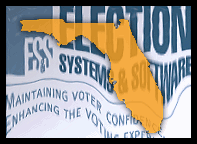 The extraordinary 3-page letter (posted in full at the end of this article) from Electronic Systems & Software, Inc. (ES&S) Vice President, Steven Pearson, is described as an "agreement" and instructs Drury on what may and may not be disclosed in the state's final audit report regarding the investigation.
The extraordinary 3-page letter (posted in full at the end of this article) from Electronic Systems & Software, Inc. (ES&S) Vice President, Steven Pearson, is described as an "agreement" and instructs Drury on what may and may not be disclosed in the state's final audit report regarding the investigation.

 Vets Push Back at Trump, Musk Plan to Slash Health Care, 80K V.A. Jobs: 'BradCast' 3/27/25
Vets Push Back at Trump, Musk Plan to Slash Health Care, 80K V.A. Jobs: 'BradCast' 3/27/25 'Green News Report' 3/27/25
'Green News Report' 3/27/25
 Signal Scandal Worsens for Trump, GOP; Big Election Victories for Dems in PA: 'BradCast' 3/26/25
Signal Scandal Worsens for Trump, GOP; Big Election Victories for Dems in PA: 'BradCast' 3/26/25 'Emptywheel' on Why Trump NatSec Team Should 'Resign in Disgrace' After Signal Chat Debacle: 'BradCast' 3/25/25
'Emptywheel' on Why Trump NatSec Team Should 'Resign in Disgrace' After Signal Chat Debacle: 'BradCast' 3/25/25 'Green News Report' 3/25/25
'Green News Report' 3/25/25 Postal Workers Union Prez: USPS 'Belongs to the People, Not the Billionaires':
Postal Workers Union Prez: USPS 'Belongs to the People, Not the Billionaires': Sunday 'Suddenly Conceivable' Toons
Sunday 'Suddenly Conceivable' Toons We're ALL Voice of America Now: 'BradCast' 3/20/25
We're ALL Voice of America Now: 'BradCast' 3/20/25 'Green News Report' 3/20/25
'Green News Report' 3/20/25 What Trump's 'Timber Production Expansion' Means (and Costs): 'BradCast' 3/19/25
What Trump's 'Timber Production Expansion' Means (and Costs): 'BradCast' 3/19/25 Courts Largely Holding Against Trump, Musk Lawlessness: 'BradCast' 3/18/25
Courts Largely Holding Against Trump, Musk Lawlessness: 'BradCast' 3/18/25 'Green News Report' 3/18/25
'Green News Report' 3/18/25 Chief VOA Reporter on Outlet Falling Silent First Time Since 1942: 'BradCast' 3/17/25
Chief VOA Reporter on Outlet Falling Silent First Time Since 1942: 'BradCast' 3/17/25 Sunday 'The Usual' Toons
Sunday 'The Usual' Toons 'Green News Report' 3/13/25
'Green News Report' 3/13/25 Trump EPA Unveils Plans to Endanger, Sicken Americans: 'BradCast' 3/13/25
Trump EPA Unveils Plans to Endanger, Sicken Americans: 'BradCast' 3/13/25 Trump Nixed Enforce-ment Against 100 Corp. Lawbreakers: 'BradCast' 3/12/25
Trump Nixed Enforce-ment Against 100 Corp. Lawbreakers: 'BradCast' 3/12/25 Bad Day for 'Strongmen': 'BradCast' 3/11
Bad Day for 'Strongmen': 'BradCast' 3/11 WI Election Could Flip Supreme Court Control, Musk Jumps In: 'BradCast' 3/10
WI Election Could Flip Supreme Court Control, Musk Jumps In: 'BradCast' 3/10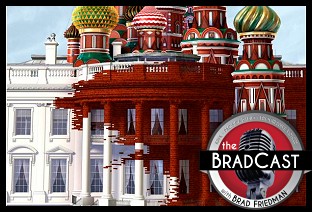 'What Else Could a Russian Asset Do That Trump Hasn't?': 'BradCast' 3/6/25
'What Else Could a Russian Asset Do That Trump Hasn't?': 'BradCast' 3/6/25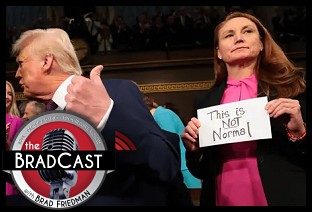 The Longest, Dullest, Most Lie-Filled 'SOTU' Ever: 'BradCast' 3/5/25
The Longest, Dullest, Most Lie-Filled 'SOTU' Ever: 'BradCast' 3/5/25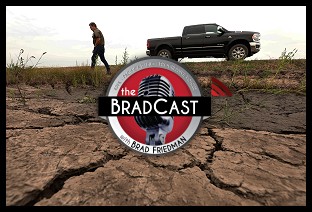 Trump Bad for Biz... and Farmers... and Nat'l Parks... and...: 'BradCast' 3/4/25
Trump Bad for Biz... and Farmers... and Nat'l Parks... and...: 'BradCast' 3/4/25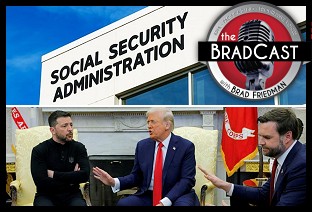 Trump Targeting 50% Cuts, Office Closures at Social Security: 'BradCast' 3/3/25
Trump Targeting 50% Cuts, Office Closures at Social Security: 'BradCast' 3/3/25
 VA GOP VOTER REG FRAUDSTER OFF HOOK
VA GOP VOTER REG FRAUDSTER OFF HOOK Criminal GOP Voter Registration Fraud Probe Expanding in VA
Criminal GOP Voter Registration Fraud Probe Expanding in VA DOJ PROBE SOUGHT AFTER VA ARREST
DOJ PROBE SOUGHT AFTER VA ARREST Arrest in VA: GOP Voter Reg Scandal Widens
Arrest in VA: GOP Voter Reg Scandal Widens ALL TOGETHER: ROVE, SPROUL, KOCHS, RNC
ALL TOGETHER: ROVE, SPROUL, KOCHS, RNC LATimes: RNC's 'Fired' Sproul Working for Repubs in 'as Many as 30 States'
LATimes: RNC's 'Fired' Sproul Working for Repubs in 'as Many as 30 States' 'Fired' Sproul Group 'Cloned', Still Working for Republicans in At Least 10 States
'Fired' Sproul Group 'Cloned', Still Working for Republicans in At Least 10 States FINALLY: FOX ON GOP REG FRAUD SCANDAL
FINALLY: FOX ON GOP REG FRAUD SCANDAL COLORADO FOLLOWS FLORIDA WITH GOP CRIMINAL INVESTIGATION
COLORADO FOLLOWS FLORIDA WITH GOP CRIMINAL INVESTIGATION CRIMINAL PROBE LAUNCHED INTO GOP VOTER REGISTRATION FRAUD SCANDAL IN FL
CRIMINAL PROBE LAUNCHED INTO GOP VOTER REGISTRATION FRAUD SCANDAL IN FL Brad Breaks PA Photo ID & GOP Registration Fraud Scandal News on Hartmann TV
Brad Breaks PA Photo ID & GOP Registration Fraud Scandal News on Hartmann TV  CAUGHT ON TAPE: COORDINATED NATIONWIDE GOP VOTER REG SCAM
CAUGHT ON TAPE: COORDINATED NATIONWIDE GOP VOTER REG SCAM CRIMINAL ELECTION FRAUD COMPLAINT FILED AGAINST GOP 'FRAUD' FIRM
CRIMINAL ELECTION FRAUD COMPLAINT FILED AGAINST GOP 'FRAUD' FIRM RICK SCOTT GETS ROLLED IN GOP REGISTRATION FRAUD SCANDAL
RICK SCOTT GETS ROLLED IN GOP REGISTRATION FRAUD SCANDAL VIDEO: Brad Breaks GOP Reg Fraud Scandal on Hartmann TV
VIDEO: Brad Breaks GOP Reg Fraud Scandal on Hartmann TV RNC FIRES NATIONAL VOTER REGISTRATION FIRM FOR FRAUD
RNC FIRES NATIONAL VOTER REGISTRATION FIRM FOR FRAUD EXCLUSIVE: Intvw w/ FL Official Who First Discovered GOP Reg Fraud
EXCLUSIVE: Intvw w/ FL Official Who First Discovered GOP Reg Fraud GOP REGISTRATION FRAUD FOUND IN FL
GOP REGISTRATION FRAUD FOUND IN FL





































